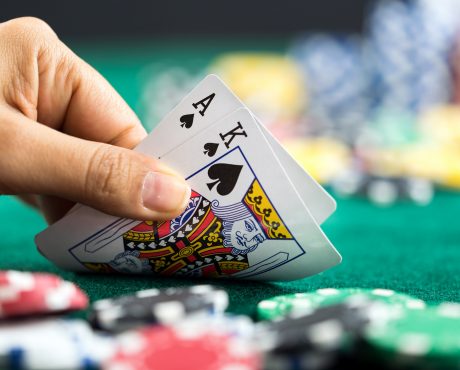Poker vs. Investing
I never had the makings of a professional poker player. Nevertheless, I tried very hard at becoming one.
The first time I saw a poker tournament on TV, I was instantly hooked.
I was not even old enough to enter a casino at the time, but after watching legends like Doyle Brunson and Daniel Negreanu battling it out, all I dreamed about was sitting at the final table of the World Series of Poker.
Obviously, that dream did not come true. The best I got was a 21st place finish at an online tournament with 2,700 entrants.
And I probably used up all my luck during that tournament. For more than a year after that event, I did not cash in any of the tournaments I entered (in a tournament, “to cash” means to make a high enough finish to earn money).
To get better at the game, I bought poker strategy books and analyzed my hands after each game. When I was in university, I took a whole bunch of statistics and actuarial science courses as electives because I wanted to improve my odds at the table.
Then, when I was doing my master’s degree in economics at the University of Toronto, I opted to take a more difficult PhD-level microeconomics sequence because it contained a two-month course on game theory taught by Martin J. Osborne, one of the brightest minds in that field.
I aced that course.
But my game still did not improve. The reason was simple: in poker, you don’t play the cards, you play the people. While I was great at calculating odds at the flop, turn, and river, I wasn’t very good at reading my opponent. The fact that I spent way more time playing online poker rather than live poker meant I had limited opportunities to improve my ability to read people.
Excuses aside, poker did make me realize that while uncertainty drew me to the game, I am not a fan of uncertainty. I liked the statistical analysis side of poker, but I did not like the fact that after putting in all the hard work, you still have to figure out what your opponents might have and what they might do based on what they have done.
And while I didn’t make it to the final table at World Series of Poker, those difficult courses I took did serve me well when I entered the financial industry.
Whether it was running regression analysis or calibrating a Black-Scholes option pricing model, I had no problem getting the job done.
But my proudest moment was when I recommended “boring” dividend-paying stocks to readers of my Income for Life advisory.
I didn’t use any complicated formula to arrive at those picks. In fact, I hardly did any math: just put together simple year-over-year comparisons, payout ratios, price-to-earnings ratios, etc.
It was all about finding companies with fundamentals solid enough to pay increasing dividends over time.
Why was I proud of that?
Well, because when I was working on complicated trading strategies, the outcome would also depend on the actions of other market participants, which is not unlike a poker game.
And since my readers are mostly retirement investors, I don’t think they should play no-limit hold’em or pot-limit Omaha with their nest egg. Through dividend investing, though, I can take that uncertainty out of the equation.
It doesn’t matter what other market participants do; thousands of short sellers can jump on a stock, but if the company wants to pay a dividend, shareholders will get a check in the mail.
And by focusing on companies that can grow their payout over time, my simple strategy helped Income for Life readers collect bigger dividend checks as time went by.
The share price performance was pretty impressive, too (although I had less to do with that because stock price movements do depend on the action of other market participants).
As of January 2019, the average open position in Income for Life’s model portfolio has returned 88.5%.
I still play cash games once in a while (with a young family, I don’t have enough time to commit to a poker tournament anymore). But I derive the most joy knowing that with my dividend investing strategy, you can earn an increasing stream of income no matter what other players do.
